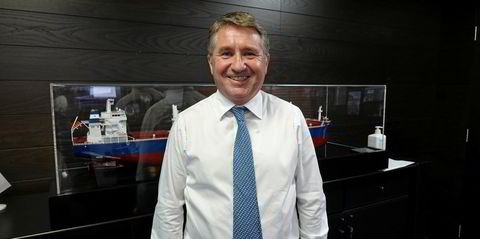Shipowner MSC Mediterranean Shipping Company expects bio and synthetic LNG to form part of its longer-term fuelling strategy as it moves towards net zero fuels.
MSC Group executive vice president for maritime policy and government affairs Bud Darr said: “In alignment with our net-zero commitments by 2050, we view fossil-based LNG as a fuel in transition, and fully expect bio and renewable synthetic LNG to be a key part of our longer-term multi-fuel strategy for deploying net zero fuels.”
Darr was speaking as MSC announced it is becoming a coalition member of the industry LNG-fuelling lobby group SEA-LNG.
The industry group highlighted that MSC has invested in LNG dual-fuelled vessels across the different sectors it operates.
MSC put its first five newbuilding dual-fuel LNG capable container ships into operation in 2022.
In the cruise sector, the company has launched the 5,400-passenger MSC World Europa (built 2022) and the 2,419-berth newbuilding MSC Euribia, both of whose maiden voyages were powered by bio-LNG.
Darr said: “We are committed to catalyzing the development, accessibility and uptake of net zero fuels.”
He added that the company looks forward to working with SEA-LNG to “further assess and collaborate on the exciting long-term prospects of bio-LNG, and particularly renewable synthetic LNG, as mainstream marine fuel molecules”.
SEA-LNG chairman Peter Keller said: “LNG is available at scale for deep sea shipping today. Existing LNG infrastructure can accommodate bio-LNG and renewable synthetic LNG as they become increasingly accessible, lowering investment barriers.”
MSC, which has also ordered dual-fuel methanol vessels, is described as “actively exploring a range of alternative fuels and propulsion solutions that will help the business move even closer towards net zero”.
According to its sustainability report, IMSC’s fleet will expand with the delivery of 14 multi-fuel-ready newbuilding vessels in 2023, 23 more vessels in 2024, 42 in 2025 and 16 in 2026.
The addition of these newbuildings will see over 4% of MSC’s fleet capacity (TEU) consist of multi-fuel-ready vessels in 2023, progressively increasing to 9% by 2024, 16% by 2025 and about 20% by 2026.
MSC said it sees cross-industry collaboration as crucial to scaling these solutions for the maritime industry.
Its decision to hook up with SEA-LNG comes as class society DNV released figures showing a second consecutive monthly record for methanol dual-fuelled newbuilding orders.
MSC, which is also an active partner and member of the Methane Abatement in Maritime Innovation Initiative and the Society for Gas as a Marine Fuel, expects to operate its vessels on a range of fuel options in the future, particularly looking at those that might become available at scale within a small number of years.






